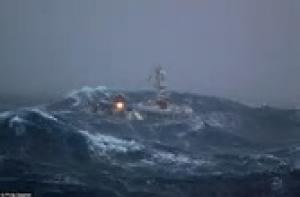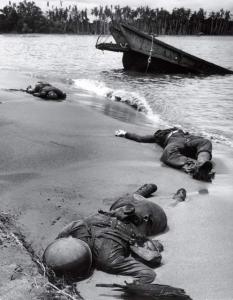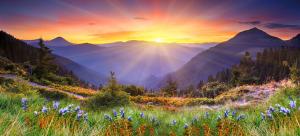The Angry Raging Waves
The fury of an angry waves cannot be compared even to the fury of hell. It is a two part short story of the angry raging waves.
The Angry Raging Waves
by DavidBokoloI was jolted awake to the sound of an ominous rumbling from the distance. Our canoe rolled from bow to helm as if some giant whale has passed under us, rubbing its back on the keel.
I shook my brother awake and pointed downstream where there was a huge dark cloud like the face of a monster, grinning with its ugly gnarled face at us.
“I think we’re going to encounter a storm,” I howled at him.
“I’m not sleeping,” he said, rubbing the corner of his eyes with the back of his left hand. “I’ve been watching that cloud also. You see, it has swallowed up all the stars in the sky.”
The encroaching darkness was supported by a very strong wind, pushing our canoe backward. The rope of the net that was tied to the front seat was drawn tautly, seeming to drag us into the deep black water.
“I think we had better draw up the net and head home,” there was a slight quiver in my voice as I said this, and hurried to the helm of the canoe, grabbing my paddle.
Every encounter in life is an adventure that leaves its impression in the subconsciousness of one’s soul throughout his life sojourn on earth. I have been looking forward to this holiday to travel with my father to the fishing camp.
My name is Inikiomoye Olali. I said I was going to tell the story about my fishing adventures the last time. Well, here is the fulfillment to that promise.
The last holiday I made was to go with my mother to Ndelle. It was during the long vacation like the one we have now. I choose to go to Ndelle with my mother to have an experience of what Ndelle market would look like, and to have a story to tell my friends back in school. That adventure nearly cost me my life.
I have made up my mind not to go out of our village during any holiday; but fishing adventure, well that has its appeal. On the other hand, all the kids in school have traveled to one place or the other, to have holiday stories to tell on the resumption of school.
We have, therefore; - my elder brother, Furotogu and I - agreed to go with our father to the fishing camp this holiday. Our little village is in Nembe, a community in the Niger Delta. Every family in our village has a small farm, but basically, fishing is the main occupation for everyone.
Every household has their type of fishing. A family may choose to only fish with hooks while others with nets. Some may decide to fish on both types depending on the season and market demand.
Some families that do fishing with net may solely concentrate on throwing of nets while others may have long nets to set traps on a particular location, or in the deep water. This also depends on the season and the type of fish at the period.
I have tried severally to throw a net, but could not get either the trick of the swing or strength to throw out the net for it to spread out over a target school of fish. I have therefore accepted to adapt our household type of fishing; setting out the net in the deep water during the night. This particular fishing method is effective to fish herrings in the rainy seasons.
Our father, Olali Bausou, does not own a particular fishing camp that he stays. We have over the years, moved from one camp to the other like the herdsmen, who move with their cattle from place to place in search of greener pasture for their flocks. Come to think of it, the life of the herdsmen and the fishermen are just about the same thing. The later moves about in search of fish, the former mobility is with his herds in search of greener pasture
This holiday, our father has decided on a place called the ‘One man Country’, a settlement along the river St. Babara. It is a long way from our home, and close to the mouth where the river empties itself into the Atlantic Ocean. It is called by that name because there is only one big thatch building in the camp.
Whoever built it must be an eccentric of some sort, to have chosen that particular portion along the river to do so. About five nautical miles upstream is a place called ‘Juju point’, a confluence point. There were three fishing camps at either side of the rivers.
Directly opposite this camp is another settlement called Twenny. We always cross this 1000 yards wide river to fetch drinking water in a bush behind this camp, and also to buy our supplies.
Though there were always traders going up and down the river with their wares, some cases would be when there were no traders. It was always a task crossing the river either in ebb or flowing tide as a result of the swiftness of the current.
Downstream from One man Country, as far as the eye could see, are dotted other settlements; collectively called Amgbakiri. Beyond the horizon, and out of sight, lie Owukubu and Akananga. These are the last camps before the river opens into the big ocean.
It is, therefore, surprising that anyone would want to come to this forsaken, snake infested - and they are many - a portion of land to erect a camp. Well, that was where we came to spend our holiday.
I was just 13 when we came on this expedition. Each morning, I would come out to the bank of the river and watch the flow of the water; a huge body of water that nothing could obstruct, or impediment, as it flows down on an unending cycle. Anything that stands on its way is swept into the ocean.
I cannot help in my childhood ignorance, wonders at the ingenuity of man to conquer his environment. Bubbling on this gigantic body of fury fluid are different types of canoes with their occupants flowing with the water in any direction it is headed or crossing the river.
It must be an over exertion of energy to try to battle against the current. Your effort would be futile to say the least.
This afternoon, we have watched with excitement the fishermen throwing their nets and making a large catch of herrings. We know the night will be a fruitful one for us also. We started getting our net clean out, and amends torn parts.
The net was about four parts of 100 yards, joint together. They are about 12 feet in height with a twine lining both sides. At the bottom, we fixed little round stone at an interval of 8 feet. At the top, we fixed floats or cork at an interval of a yard. The idea is that the twine on both ends will allow the net to maintain a straight line from the point of launch to the end that is tied to the canoe.
The stones at the bottom will allow the net to sink straight down while the floats will hold it up so that the whole net will not sink to the floor of the river, or to form a muddled entanglement. And since the river is so deep, the bottom of the net will not be sweeping the river bed and getting entangled with whatever the water is carrying along as it swept along its part.
On our part, we will just be tagging along with the net wherever the water bears us to. The beauty of this is the fact that herrings move in school. The net will either get to them or they will come to it. In the ensuing melee and confusion, they will get entrapped in the net, and the fishermen will return home satisfied with their day’s work. And since this is done mostly in the night when the water is dark, it would be satisfied night labor for the fishermen.
The process of launching and drawing up the net will be done many times in the course of the night, with the flow of the water either in ebb or flow tide. Some nights could be so frustrating when one labors through this hectic maneuvering, and could not catch much to show for it. Such nights brought into my remembrance a story our teacher told us in the school. It is about a certain fisherman who toiled through the night but caught nothing until he had an encounter with Jesus Christ in the morning.
At 6 pm, we boarded our various canoes with all the accouterments for night fishing. It was Furotogu and me alone that were going tonight. We have a big hurricane lamp filled with kerosene, a bottle of diesel to use against mosquitoes. We use this to rub our bodies to keep the mosquitoes at bay. They are one of the night fishermen companions. They come in droves, that sometimes; you open your mouth to speak at the risk of swallowing them.
We dressed up covering our whole body with a sweater, trousers, and woven raffia hats. The nets are heaped up behind the front seat of the canoe. We have a wooden platform in the center where we may stretch out and take a nap as we float along with the net. There is an opening between the two last seats to bail out water from the canoe.
The tide was flowing as we set out. It was our second week in the camp, and we knew exactly what is expected of us to do.
“Watch out for ‘Idoni’ before the last turn to Juju point,” our father came to the waterfront to wish us off.
Idoni is long sticks set in V-shape erected in the middle of the river by certain fishermen. They are fish traps that allow fish to congregate in line with the sticks, in the process got entrapped by a giant woven basket placed at the V-joint.
If one does not mind the flow and position of the Idoni, his net might get entangled with them. There is no retrieving such net as it would be shredded in pieces by the oyster shells that have formed on the sticks.
“Ah papa,” my brother called out with a smile. “This is not our first night out. We know the river like every other person out there,” he added as he pushed the canoe out with his paddle.
“Mind the control of the canoe, Inikio,” my father warned me, a grin in his face.
I waved at him with a smile, “we will be back Papa, Relax.” He moved to touch his head with his finger but withdrew it. My father was in the mid-30s, about 6 feet tall. The toil of life has hardened his face, but he still managed a smile as he waved back at me.
Standing beside him was his boatman, Polobotari, a fair skinned man. He has a lean on his right leg when he walks. His face was red from frequent sneeze as a result of snuffing. Even now, he was tapping at the cover of his snuff bottle; a ritual he performs before opening the bottle.
We were immediately swept away by the current the moment we pushed out the canoe.
“The tide may not flow for long before it will start to ebb,” my brother was saying. He was sitting at the front seat facing me at the helm of the canoe, trying to select out the head of the net, “we may not get to Juju Point before it turns.”
“That will be better for us.” I agreed. “We will then float with the current close to Owukubu before it will stop.”
“Look at that,” he shouted excitedly, pointing at a line in the water. I turned to see, in the fading light, a golden line moving across the river. It is not just one, but many such lines almost everywhere.
“That is herring schools all over the river,” I shouted back to him. Far away, I can make out the dark shapes of many other canoes. Some of them have already started paying out their nets as the helm men paddling vigorously across the river
“Turn around the canoe and let’s start launching,” he waved his hands to me.
I was not waiting for his instructions; I have already started turning the canoe around, the helm facing midstream. He took his position, standing with the heap of the net between his open legs, and picked up the head float that will mark the beginning of the net. As I started paddling backward, he launched out the net in a fluid-like motion.
We were almost to the midway across the river when he launched the last part of the net. It was dark all over the river, but all around us were flickering lights from tens of scores of other hurricane lamps like starlight, where fishermen have taken possession of St Babara River.
More from DavidBokolo
The Weightless Weight
by DavidBokolo
Some times we got weight down by thoughts and imagination that do not have weight. the sooner we realize that, we'll be up and going. So says the old man
- Aug, 3 2015
- Lyric
"You Ripped my Love Into Shreds"
by DavidBokolo
Too much love of the cat, they say, kills the moth. Most love relationship got broken as a result of wrongly managed petty frail nerves. Like as I love to say, just musing.
- Sep, 11 2015
- Free Verse
Sing Me Another Love Song My Love
by DavidBokolo
I held on to my Love and refused to let Him go even when I feel him slipping away
- Sep, 15 2015
- Free Verse Lyric
"And Yet The battle Rages On"
by DavidBokolo
There are many unsung Heroes whose heroism is lost in time and space
- Sep, 23 2015
- Prose
I Wish I Could Rewind The Time
by DavidBokolo
I wish I had Known Him many years ago, It,s not too late now though, but I wish I could rewind the time
The One Who Bears My Burden
by DavidBokolo
In sequel to a previous poem, 'Sweet Memories Lingers', Good always sail over our pains if we take time to ponder.
- Aug, 27 2015
- Prose







